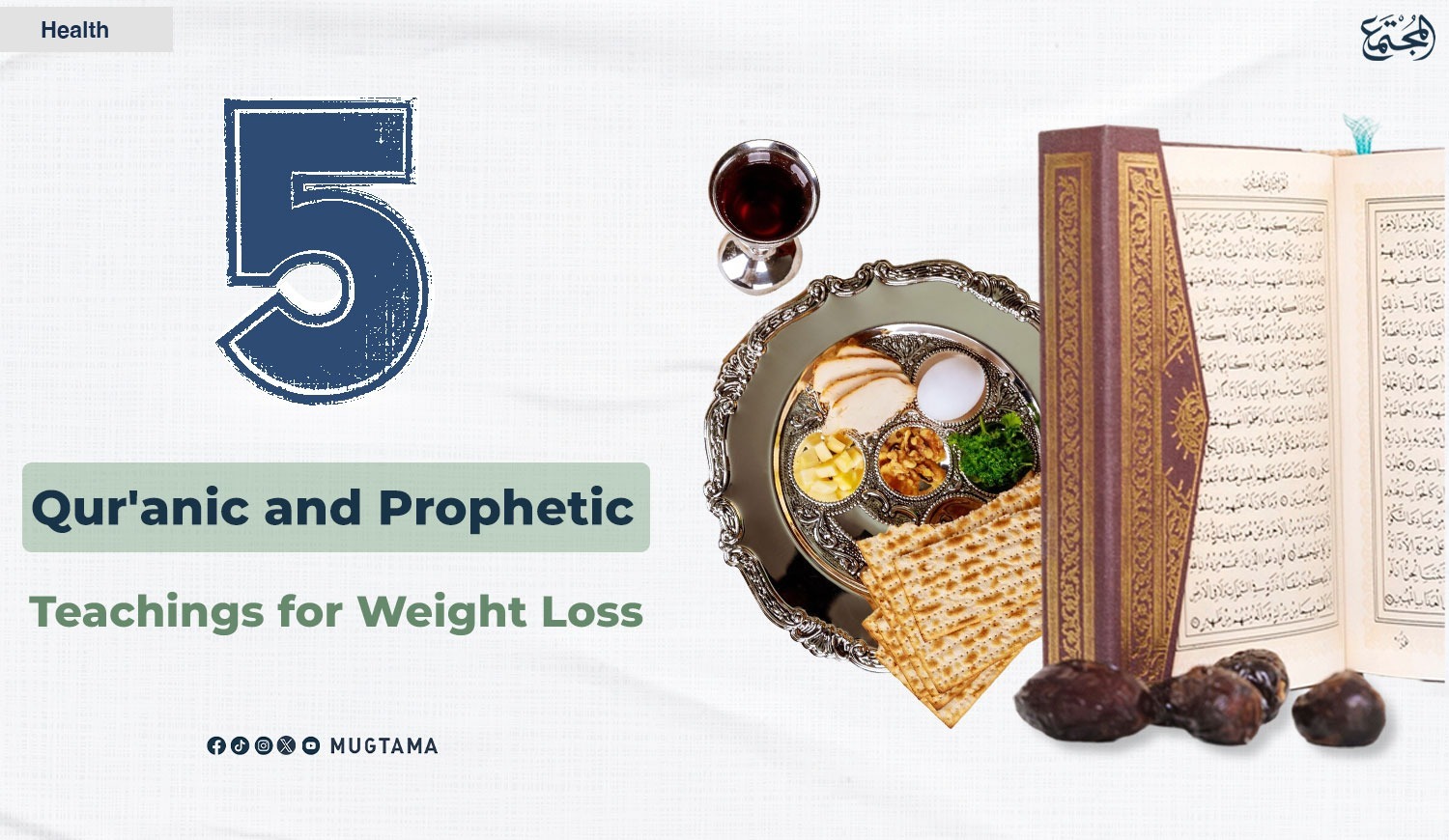5 Qur'anic and Prophetic Teachings for Weight Loss

You are bombarded daily with advertisements
for weight loss, fat suction, and attaining fitness and beauty—all in exchange
for large sums of money, risky surgeries, or negative health consequences.
Amid all this, one might overlook the
“diet” introduced by the Qur’an and the noble Sunnah—the teachings of Prophet
Muhammad ﷺ—that addressed every crisis or hardship a person may face.
Indeed, there is a Qur’anic and Prophetic
"diet"—if the expression is allowed—that could grant you the
opportunity to reach your ideal weight and eliminate obesity and flabbiness,
all while observing the guidelines provided by people of knowledge and
expertise.
First: Allah says in His
decisive Book: “And eat and drink but be not
excessive. Indeed, He likes not those who commit excess.” (Al-A'raf: 31). This is a divine directive
toward moderation and refraining from overindulgence.
The Prophet ﷺ said: “Eat, drink,
give sadaqa and wear clothes so long as neither prodigality nor pride is mixed
up with it.” (Narrated by al-Nasa’i). Imam Ahmad ibn Hanbal
explained that extravagance manifests in two ways: First, spending beyond one’s
means, such as excessively hosting guests beyond one’s capacity—this is
considered wasteful and condemned. Second, consuming food in a way that overburdens
the stomach and body; if one is ill, it worsens the illness, and if healthy, it
may lead to indigestion.
Second: Among the steps of the
Prophetic diet is what the Messenger ﷺ affirmed
when he said: “No man fills a container worse than his stomach. A few morsels that keep
his back upright are sufficient for him. If he has to, then he should keep
one-third for food, one-third for drink and one-third for his breathing.”
(Narrated by al-Tirmidhi).
To this day, medical and nutritional
experts recommend this. Some scholars stated that if Hippocrates—one of the
greatest physicians in Greek history—had heard this rule and division from the
Prophet ﷺ, he would have been amazed. This division is scientifically and
medically confirmed as essential for maintaining health.
Third: Observing fasting—such
as the six days of Shawwal or fasting Mondays and Thursdays—is part of the
Prophetic diet. Allah says: “But to fast is best
for you, if you only knew.” (Al-Baqarah: 184). And the
Prophet ﷺ said: “Fast and you will be healthy.” (Narrated by
al-Tabarani, graded as sound by al-Suyuti and weak by al-Albani).
In this regard, scientific studies confirm
that fasting offers multiple health benefits, such as boosting immunity,
improving the function of vital organs, detoxifying the body, and treating
ailments like arteriosclerosis, high blood pressure, obesity, and others.
Professor Nikolaiev Beloi, a Russian
academic, stated in his book “Fasting for Health” that every person
should practice fasting by refraining from food for four weeks each year in
order to enjoy perfect health for life.
Fourth: Modern studies
highlight the benefits of intermittent fasting as one of the most effective and
compatible weight loss methods, especially after Ramadan. This method aligns
with the body's habit of abstaining from food for long hours during the day.
For diet enthusiasts and those wishing to
shed extra weight, intermittent fasting can be implemented by consuming food
only during a specific time window each day and refraining from eating the rest
of the day—while staying hydrated with plenty of water.
Fifth: The Prophet’s ﷺ practices
were a guiding light that preceded modern medicine in caring for health and
pursuing what benefits the body. Collectively, they promote strength,
well-being, and physical fitness. Among these was his fondness for eating
dates. Sa’d ibn Abi Waqqas reported that the Messenger of Allah ﷺ said: “He who eats
seven 'Ajwa dates every morning, will not be affected by poison or magic on the
day he eats them.” (Narrated by Muslim).
The Prophet ﷺ also loved
drinking milk. He said: “Nothing but milk can substitute for both food and drink.”
(Narrated by al-Tirmidhi). He also preferred cool, sweet water and would
drink in three breaths. Anas ibn Malik reported: “The Messenger of Allah ﷺ used to breathe into the vessel three times when
he drank.” (Narrated by al-Bukhari and Muslim).
He also said: “When one of you drinks, he must not breathe into the vessel.” (Narrated
by al-Bukhari). In another narration, he would breathe three times while
drinking and would say: “It is more thirst-quenching, healthier, and more wholesome.”
(Narrated by Muslim).
He ﷺ never ate
while reclining or lying down. He said: “I do not eat reclining.” (Narrated by
al-Bukhari).
-------------------------------------------------------------










